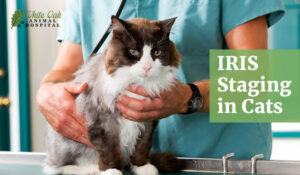
Choosing between holistic medicine vs. Western medicine for animals is a pivotal decision point for pet owners as they endeavor to secure optimal care for their cherished companions. Within the realm of veterinary care, professionals primarily adhere to the principles of conventional Western medicine. Nevertheless, some practitioners embrace holistic or integrative methodologies, enriching their treatment repertoire with alternative therapies that synergize with established practices. Appreciating the nuances between these divergent paths is essential for pet owners as they steer their pets toward health and wellness.
Fundamental Principles of Holistic Medicine for Animals
 Holistic medicine vs. Western medicine for animals encompasses a comprehensive approach to pet care, focusing on treating the entire being—mind, body, and spirit. Unlike traditional Western medicine, which often targets specific symptoms or ailments, holistic medicine adopts a more inclusive perspective, acknowledging the interconnectedness of various aspects of an animal’s well-being.
Holistic medicine vs. Western medicine for animals encompasses a comprehensive approach to pet care, focusing on treating the entire being—mind, body, and spirit. Unlike traditional Western medicine, which often targets specific symptoms or ailments, holistic medicine adopts a more inclusive perspective, acknowledging the interconnectedness of various aspects of an animal’s well-being.
At its core, holistic medicine prioritizes individualized care, tailoring treatment plans to address physical symptoms and emotional and psychological factors. This approach recognizes that many internal and external elements influence an animal’s health, including diet, environment, and the quality of the bond shared with their human companions.
Diagnosis and Treatment Approaches: Holistic vs. Western Medicine for Animals
 When comparing holistic medicine vs. Western medicine for animals, the diagnostic process in holistic medicine takes a comprehensive approach. It entails a thorough assessment of the pet’s overall well-being, considering visible symptoms and underlying factors like diet, lifestyle, and emotional state. In holistic medicine vs. Western medicine for animals, Western medicine relies extensively on standardized diagnostic procedures such as blood tests and imaging studies. These methods aim to identify specific diseases based on observable symptoms and laboratory findings.
When comparing holistic medicine vs. Western medicine for animals, the diagnostic process in holistic medicine takes a comprehensive approach. It entails a thorough assessment of the pet’s overall well-being, considering visible symptoms and underlying factors like diet, lifestyle, and emotional state. In holistic medicine vs. Western medicine for animals, Western medicine relies extensively on standardized diagnostic procedures such as blood tests and imaging studies. These methods aim to identify specific diseases based on observable symptoms and laboratory findings.
Regarding pet health, there are two main approaches: holistic medicine vs. Western medicine for animals. Holistic medicine provides a wide range of treatments to get to the root causes of illness and improve overall well-being. In holistic medicine vs. Western medicine for animals, Western medicine typically relies on pharmaceutical drugs, surgeries, and other conventional treatments to address symptoms or specific diseases. The focus here is often on providing immediate relief or managing short-term issues through medication, surgery, or other medical interventions.
When comparing holistic medicine vs. Western medicine for animals, one area of distinction lies in their philosophical approaches. In holistic medicine vs. Western medicine for animals, Holistic medicine embraces a holistic philosophy, recognizing the intricate connections among various aspects of health, spanning from the physical to the emotional, mental, and even spiritual dimensions. In this paradigm, practitioners aim to address the entirety of the animal’s well-being rather than merely treating isolated symptoms. This comprehensive approach emphasizes preventive care, advocating for lifestyle adjustments tailored to the individual animal’s needs and supporting the innate healing capabilities present within the pet.
On the other hand, Western medicine often adheres to a reductionist perspective. Here, the body is perceived as a composition of distinct systems, each capable of being treated in isolation. The focus of Western medicine typically revolves around the identification and treatment of specific diseases or conditions using standardized protocols and evidence-based practices. While effective in targeting particular ailments, this approach may place less emphasis on holistic principles or proactive measures for preventive care.
Holistic Medicine vs. Western Medicine for Animals: Can They Coexist?
Comprehensive Care
 When thinking about the compatibility between holistic medicine vs. Western medicine for animals, it’s important to understand how they each work. Holistic medicine looks at everything that affects an animal’s health, like their body, feelings, and even their spirit. On the other hand, Western medicine focuses on treating specific problems with specialized treatments. Both approaches have their strengths. Holistic care considers the whole animal, while Western medicine is good at treating specific issues. By using both together, pet owners can make sure their animals get the best care possible, covering all their different needs.
When thinking about the compatibility between holistic medicine vs. Western medicine for animals, it’s important to understand how they each work. Holistic medicine looks at everything that affects an animal’s health, like their body, feelings, and even their spirit. On the other hand, Western medicine focuses on treating specific problems with specialized treatments. Both approaches have their strengths. Holistic care considers the whole animal, while Western medicine is good at treating specific issues. By using both together, pet owners can make sure their animals get the best care possible, covering all their different needs.
Combined Expertise
 Instead of “choosing between” holistic medicine vs. Western medicine for animals, they can actually coexist in the realm of animal care. It’s valuable to recognize the benefits of combining their strengths. By blending the expertise of practitioners from both disciplines, pet owners can access a wealth of knowledge and techniques. This collaborative effort fosters a synergistic approach to pet care, where the unique insights and skills of each discipline complement one another. The result is an enhanced ability to address a variety of health concerns in animals, ultimately leading to improved treatment outcomes and overall well-being.
Instead of “choosing between” holistic medicine vs. Western medicine for animals, they can actually coexist in the realm of animal care. It’s valuable to recognize the benefits of combining their strengths. By blending the expertise of practitioners from both disciplines, pet owners can access a wealth of knowledge and techniques. This collaborative effort fosters a synergistic approach to pet care, where the unique insights and skills of each discipline complement one another. The result is an enhanced ability to address a variety of health concerns in animals, ultimately leading to improved treatment outcomes and overall well-being.
Preventive Focus
When choosing between holistic medicine vs. western medicine for animals, it’s crucial to think about how they can team up to keep pets healthy. Holistic medicine focuses on preventing health issues by encouraging lifestyle changes and taking steps to stop sickness before it starts. Western medicine plays a part in this too, using tools to find problems early and suggesting vaccinations to prevent diseases. When pet owners combine both holistic and Western methods, they build a complete plan to keep their animals in good shape and boost their overall well-being.
Individualized Treatment
In examining how holistic medicine vs. Western medicine for animals can work together, it’s important to understand how they treat pets. Holistic medicine looks at the whole picture of an animal’s health, taking into account everything about them, and then designs treatments specifically for each pet based on their individual needs. On the other hand, Western medicine relies on proven methods to diagnose and treat health issues, making sure that the treatment is exactly right for the problem at hand. By combining these two approaches, pet owners can ensure that their furry friends get the best care possible, with treatments that are tailored to suit them perfectly.
Enhanced Options
 In considering the options of holistic medicine vs.Western medicine for animals, it’s imperative to weigh the advantages of integrating both approaches. By embracing both holistic and Western medicine, pet owners can expand their range of treatment options and modalities, thereby enhancing the quality of care for their beloved companions. This expanded repertoire empowers pet owners to make well-informed decisions regarding their pets’ health, ensuring that they receive comprehensive and tailored treatment plans that address their individual needs and preferences. By incorporating elements from both holistic and Western medicine, pet owners can create a holistic approach to their pets’ healthcare that optimizes well-being and promotes longevity.
In considering the options of holistic medicine vs.Western medicine for animals, it’s imperative to weigh the advantages of integrating both approaches. By embracing both holistic and Western medicine, pet owners can expand their range of treatment options and modalities, thereby enhancing the quality of care for their beloved companions. This expanded repertoire empowers pet owners to make well-informed decisions regarding their pets’ health, ensuring that they receive comprehensive and tailored treatment plans that address their individual needs and preferences. By incorporating elements from both holistic and Western medicine, pet owners can create a holistic approach to their pets’ healthcare that optimizes well-being and promotes longevity.
In conclusion, when considering the best approach to care for your beloved pet, the integration of holistic medicine and Western medicine for animals offers a comprehensive solution. By combining the strengths of both approaches, pet owners can ensure their pets receive well-rounded and personalized care that addresses their unique needs. As advocates for your pet’s health, we encourage you to schedule an appointment with Dr. Casey Damron at White Oak Animal Hospital.
Western medicine for animals offers a comprehensive solution. By combining the strengths of both approaches, pet owners can ensure their pets receive well-rounded and personalized care that addresses their unique needs. As advocates for your pet’s health, we encourage you to schedule an appointment with Dr. Casey Damron at White Oak Animal Hospital.
With over 28 years of experience and a track record of treating over 6,000 pets, Dr. Damron provides expert guidance and compassionate care. At White Oak Animal Hospital, we offer integrative options not available elsewhere, including TCVM Telemedicine consultations, to support your pet’s health and well-being. Trust us to provide the exceptional care your pet deserves.
Related Posts
-
The 5 Secrets of Holistic Medicine: Finding the Right Holistic Veterinarian Near Me
As a pet owner, I wanted to find the best holistic veterinarian near me. We…
-
Western And Holistic Cat Arthritis Treatment Options
Cats suffer from arthritis just like people do. Luckily, there are many cat arthritis treatment…
-
The Power of Alternative Medicine for Animals: 5 Exceptional Reasons Alternative Medicine Can Transform Your Pet's Life
In recent years, a gentle revolution has quietly unfolded in the world of pet healthcare.…
-
Book an Herbal Medicine Consultation to Discover Solutions for Your Pet | Herbal Medicine for Pets
Herbal medicine consultations are an excellent option for pet parents who have specific questions about…









